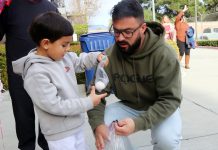SANTA CRUZ COUNTY—The California Department of Public Health has approved a plan for a local group to operate a syringe services program in Santa Cruz County.
Organizers for Harm Reduction Coalition of Santa Cruz County (HRCSCC) have said they plan to provide syringes to drug users through a “needs-based” syringe services program (SSP), meaning the numbers they hand out are not limited by the one-for-one model employed by the county health services agency. The nonprofit has said it plans on providing home delivery services.
The organization also provides overdose prevention services and provides the opioid overdose antidote Naloxone to at-risk communities.
According to the HRCSCC, syringe services programs prevent the spread of infectious diseases, as well as provide sanitizing supplies and clean drug use equipment.
The authorization will allow HRCSCC to get their supplies directly from the North American Syringe Exchange Network, based out of Washington state, which the other 56 SSPs throughout the state use.
HRCSCC organizers have said since its inception in 2018 that Santa Cruz County’s one-for-one syringe exchange policy is unrealistic and does little to address the problem of needle-born diseases among drug users.
“There is a large amount of public health research that shows that one-for-one exchange models are deeply flawed, and do not decrease syringe litter or improve health outcomes of the program,” founder Kate Garrett said.
Out of the 56 SSPs in California, only five use one-to-one models, with the rest being needs-based, she said.
“This is incredible news not just for people who inject drugs but for the whole community,” Garrett said. “With the backing of CDPH, we will be able to reach more people and do more work. This means there will be less disease being spread, fewer needles on the ground, more overdoses being reversed and more people being given a chance to get referred to treatment and mental health services.”
The organization has been criticized in the past by groups who say that handing out unlimited numbers of syringes leads to more being found in public places such as beaches and parks.
“Take Back Santa Cruz’s (TBSC) Needles Solutions Team is extremely disappointed in the California Department of Health’s decision to allow an activist coalition to distribute needles across the County of Santa Cruz despite the lack of need and the risk to public safety,” TBSC member Gabrielle Korte said, speaking on behalf of TBSC’s Needles Solutions Team.
HRCSCC’s application, Korte said, garnered unanimous opposition from every law enforcement agency in the County, unanimous opposition from the Santa Cruz County Board of Supervisors, and widespread community opposition.
Korte added that, while the HRCSCC is currently barred from giving out needles in “recreational parks,” they can conduct “home deliveries” anywhere in the county, which includes homeless encampments and open spaces.
“The HRCSCC is the group responsible for the thousands of dirty needles picked up by City Workers after the Ross Camp closure,” Korte said.
HRCSCC, meanwhile, says that syringe service programs either decrease or have no appreciable impact on syringe litter and that the group in 2019 turned in 140,580 used syringes for proper disposal.
“We understand the concern the community has about finding syringes on the ground,” organizer Dani Drysdale said. “I don’t want that to happen, ever. Nobody wants that to happen, and it’s something our coalition cares about deeply, it’s a big part of why we do this work.”
According to HRCSCC, the new SSP will be coming online over the next couple of months. They plan to continue operating at the same location that they have been providing services at for about two years, and they plan to provide a home delivery service to people across the county.
The authorization by the state comes on the heels of the news that HRCSCC was approved for a $405,000 grant over the next three years through the California Harm Reduction Initiative. The group plans to use the money to fund full and part-time staff positions and to provide stipends to people who assist in the operations of their program.











